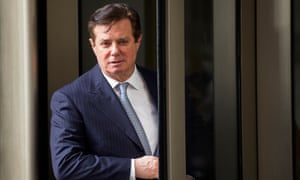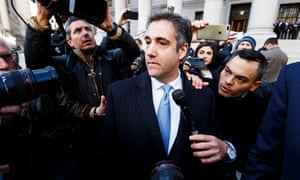Extract from The Guardian
Trump implicated in campaign finance law violations regarding women who claimed affairs
One of Donald Trump’s closest advisers spoke during the 2016 election
campaign with a Russian offering help from Moscow and a meeting with
the Russian president, Vladimir Putin, the special counsel Robert Mueller revealed on Friday.
Federal prosecutors also alleged that Trump directed the adviser, Michael Cohen,
to make illegal payoffs to two women who claimed to have had sexual
relationships with Trump, implicating the president in the violation of
campaign finance laws. They recommended that Cohen receive a prison
sentence of about four years.The disclosures heaped new pressure on Trump, whose presidency has come under siege from Mueller’s investigation into Russia’s interference in the 2016 US election and a spinoff inquiry into Cohen, his lawyer and legal fixer for more than a decade.
They were swiftly followed by new revelations in the criminal prosecution of Trump’s former campaign chairman, Paul Manafort. He was accused by Mueller of repeatedly lying about his relationship with an alleged former Russian intelligence operative and about his recent communications with Trump’s White House.
Following a week of increasingly frenzied attacks against Mueller, Trump falsely stated on Friday evening that the latest development “totally clears” him. In fact, investigations appeared to be edging ever closer to the door of the Oval Office.
The special counsel’s filing said Cohen’s November 2015 conversation with a Russian national was among other “contacts with Russian interests” he had while the Kremlin was interfering in the election to help Trump.
In a separate filing, federal prosecutors in New York said Cohen “acted in coordination and at the direction of” Trump when setting up payments to buy the silence of Karen McDougal, a former model, and Stormy Daniels, a pornographic actor, who were considering making public their allegations of affairs with Trump.
Cohen and Trump paid the women to suppress their damaging stories and “to influence the 2016 presidential election”, the filing said.
The White House press secretary, Sarah Sanders, told reporters the filings contained “nothing of value that wasn’t already known”, saying Cohen had “repeatedly lied” and was “no hero”.
Mueller separately alleged that Manafort falsely claimed he had had no contact with anyone in Trump’s administration since they entered office. In fact, Mueller said, he was in communication with a senior official until February this year, and asked an intermediary to talk to an official on his behalf as recently as late May.
The contacts will be of great interest to investigators. Whether Manafort’s ties to pro-Kremlin figures in eastern Europe are connected to Russia’s interference in the 2016 election remains the central unanswered question in the Trump-Russia inquiry.
While Mueller said Cohen provided significant help to his investigation, prosecutors said Cohen had overstated his overall cooperation with the government and had shown a “rose-colored view of the seriousness of the crimes”.
Cohen was motivated by greed and “repeatedly used his power and influence for deceptive ends”, the prosecutors said in a court filing. “After cheating the [Internal Revenue Service] for years, lying to banks and to Congress, and seeking to criminally influence the presidential election, Cohen’s decision to plead guilty – rather than seek a pardon for his manifold crimes – does not make him a hero.”
Despite his wrongdoing, Mueller said, Cohen disclosed “useful information concerning certain discrete Russia-related matters” at the core of his investigation. US intelligence agencies have concluded Russia’s interference was aimed at helping Trump and harming the campaign of Hillary Clinton, his Democratic opponent.

On Friday, Mueller disclosed that in November 2015, Cohen separately spoke with a Russian “who claimed to be a ‘trusted person’ in the Russian Federation” and offered Trump’s campaign “political synergy” and “synergy on a government level”.
The Russian repeatedly proposed a meeting between Trump and Putin, according to Mueller, and told Cohen the meeting “could have a ‘phenomenal’ impact ‘not only in political but in a business dimension as well’”, because there was “no bigger warranty in any project than consent of Putin”.
Mueller said Cohen chose not to pursue the offer of assistance in part because he was working on the project with someone else he “understood to have his own connections to the Russian government”, a likely reference to Felix Sater, a developer who was working on the Trump Tower Moscow plans.
Cohen previously pleaded guilty in August to violating election campaign finance laws by arranging the payments to the two women. He also pleaded guilty to several financial crimes relating to his business and tax affairs.
Last week, Mueller tore up a plea deal with Manafort and told a judge he repeatedly lied to investigators even after agreeing to cooperate with the Trump-Russia investigation.
In his submission on Friday, Mueller said Manafort had continued lying about five areas of the inquiry, including his relationship with Konstantin Kilimnik, a Russian employee of Manafort’s political consulting firm. Kilimnik is alleged to have ties to Russian intelligence services, which he denies. Manafort and Kilimnik are accused of asking business associates early this year to lie about their past lobbying work.

No comments:
Post a Comment